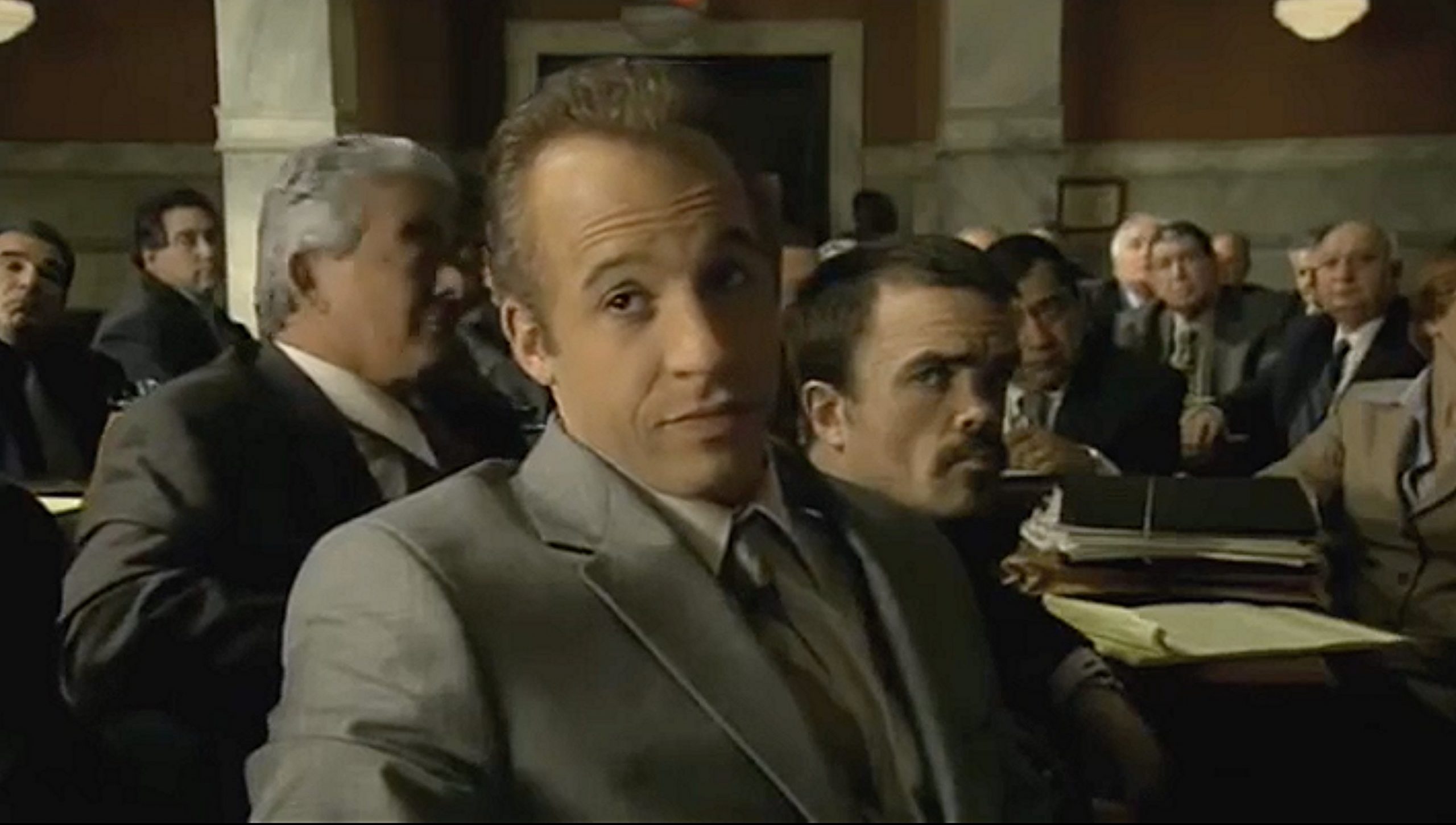If you’re a fan of Sidney Lumet‘s Prince of the City (and what Lumet admirer isn’t?) and you haven’t seen Find Me Guilty (’06), which many have ignored or dismissed as a commercial failure, you need to buckle down and rent it.
I know that Find Me Guilty never seems to come up much in discussions of Lumet’s career, and yet it’s absolutely one of Lumet’s finest and is certainly one of the greatest films ever made by a director who’s over 80. (Lumet’s Before The Devil Knows You’re Dead, released in ’07, also belongs on that list.)
I haven’t re-watched Guilty since it opened 16 years ago, but I’ll be revisiting tonight.
Guilty is a marvel of old-fashioned (i.e., ’80s-style) craftsmanship — Lumet’s superb direction, T.J. Mancini and Robert McCrea’s’s finely structured screenplay and skillfully pared-down dialogue, and Vin Diesel’s inescapably charming, sincerely felt performance that briefly put him back on the road map. It was the last first-rate performance he ever gave.
In my book Find Me Guilty was Lumet’s best film since Q & A (1990), and before that Prince of the City (1981). It’s a tight, no-nonsense court drama that’s not about legal maneuvers or discovering evidence or doing right by the system and justice being served, but mob family values.
It’s not without its amusements and gag lines from time to time, but Guilty is a fairly serious, rooted-in-reality court procedural about wise-guy morality, or the urban mythology about same..
There’s more time spent in a courtoom in this thing than in Lumet’s The Verdict, and for good reason: Find Me Guilty is about the longest-lasting federal criminal prosecution in history. From March ’87 to August ’88, 20 members of the New Jersey-based Lucchese crime family, each represented by his own lawyer, were brought to trial in Newark, New Jersey, on some 76 charges (dope smuggling, gambling, squeezing small businesses…the usual mob stuff).
The mob family values can be summed up by the words “don’t rat,” “don’t roll” and “family is everything.”
I’m talking about the values of a group of bad guys (i.e., men who live outside the law and occasionally enforce their ethical standards by whacking each other) who ostensibly care for and someitmes “take care of” each other, and about one particular bad guy — Diesel’s Jackie DiNorscio — who stood up for certain things over the course of this trial…loyalty, friendship, togetherness…even if the reality of Italian crime ethics, going by everything I’ve heard, is that everyone rats out everyone else sooner or later and a lot of these guys are just full-out sociopaths, or are viewed this way by the majority. And yet Guilty isn’t an invented story.
What’s really striking is that Find Me Guilty delivers pretty much the precise opposite moral message of Prince of the City, which is about the emotional torment that a corrupt cop puts himself through when he decides to tell the absolute truth and rat out his equally corrupt cop friends, and ends up despised and lonely and broken.
Guilty is about a wise guy who refuses to rat out his wise-guy friends, even when most of them shun him and treat him like a leper because of his court behavior, but who nonetheless holds to his own moral ethical course.
Has there ever been a major-league filmmaker besides Lumet who has made two films about the same culture — the New York-area criminal underworld — with both (a) based on a completely true story about courts and prosecutors and defendants, (b) both grappling with almost the exact same moral-ethical issue, and yet (c) coming to almost the exact opposite conclusions about ratting out your friends?
His slightly fake-looking rug aside, Diesel is amazing. At times he seems to be just joshing around and more into charming the audience (along with the on-screen jury) than rendering a character, but it gradually seeps in that he’s really playing Jackie DiNorscio and capturing what made him tick and who he really was.
And the supporting actors…fuhgedaboutit. Peter Dinklage delivers a pitch-perfect performance — an utterly believable incarnation of a fully-rounded hardball lawyer. Anabella Sciorra has only one scene with Diesel, in a tiny prison holding room, but the husband-and-wife vibe is dead-on with the old resentments and sexual current getting stronger and stronger — it’s a near-classic scene.
Also excellent are Ron Silver as the presiding judge, Alex Rocco as the viper-like head of the crime family being prosecuted, and Linus Roache as the steely-eyed, go-for-broke prosecutor. The film was perfectly cast in the legendary Lumet-New York street guy tradition by Ellen Chenoweth and Susie Farris. Cheers also for the cinematography by Ron Fortunato, which is beautifully framed and lit all through.

